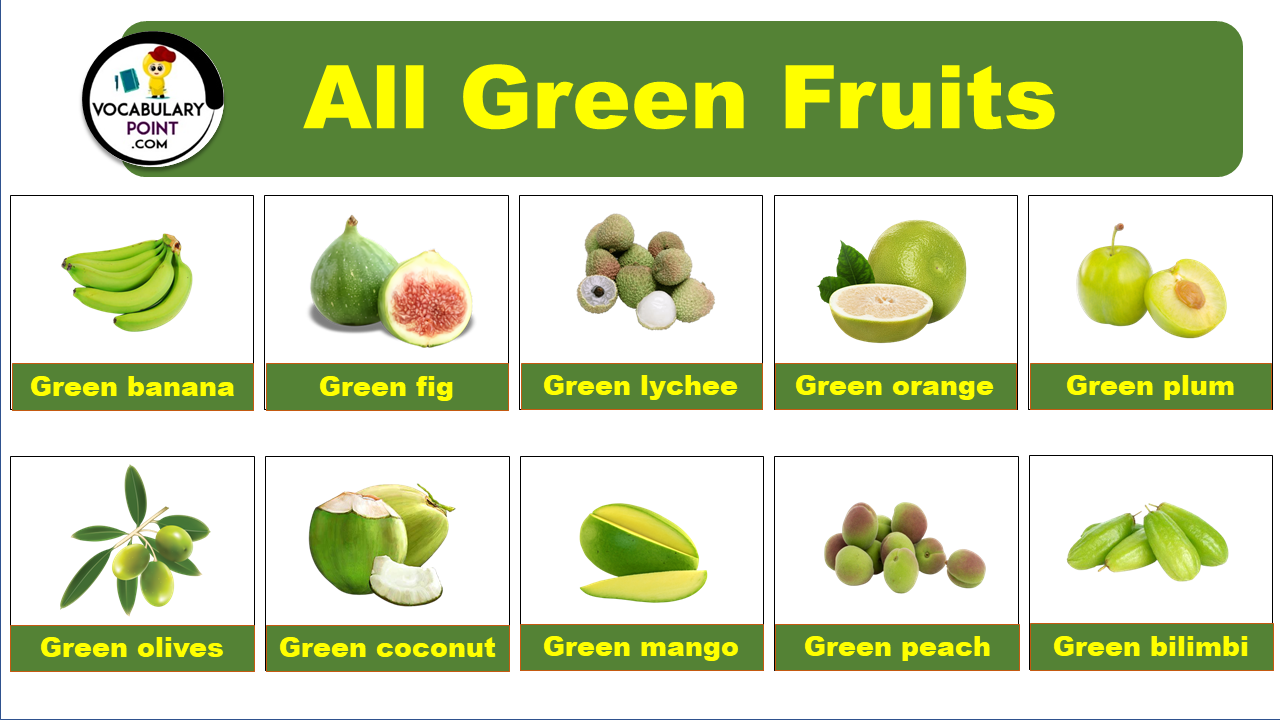Green fruits are not only visually appealing, but they also offer a plethora of health benefits. From tangy apples to creamy avocados, the world of green fruits is diverse and intriguing. Whether you’re looking to add more fiber to your diet or boost your immune system, these vibrant fruits have got you covered. In this article, we will explore an extensive list of all the green fruits that nature has gifted us with.
List Of Green Fruits
Green Apricot
Unripe apricots, tart and firm, often used in cooking or pickling before they sweeten and soften.
Green Blueberry
Young blueberries, not yet ripe, with a more tart and less sweet flavor than their mature, blue counterparts.
Green Finger Lime
An immature stage of finger limes, citrus fruits known for their caviar-like pearls, offering a tart flavor.
Green Miracle Fruit
An unripe version of the miracle fruit, which when mature, makes sour foods taste sweet due to a compound called miraculin.
Green Breadfruit
Immature breadfruit, starchy and not yet sweet, used in similar ways to potatoes and other root vegetables.
Green Lemonade Fruit
An early harvest of lemonade fruit, which tastes like lemonade, not yet sweet or fully developed in flavor.
Green Noni
Unripe noni fruit, known for its strong, pungent smell and bitter taste, often used in traditional medicine.
Green Currant
Early stage currants, typically more tart and firm, used in cooking and preserves before they fully ripen.
Apple
A popular fruit with varieties ranging from sweet to tart, consumed fresh, cooked, or used in beverages.
Green Sugar Apple
An immature stage of sugar apple with a hard exterior, not yet soft or sweet enough for typical consumption.
Feijoa
A small, green fruit with a unique taste that combines the flavors of pineapple, guava, and mint, also known as pineapple guava.
Green Cranberry
Unripe cranberries, very tart and firm, typically harvested mature and red for their characteristic flavor.
Green Dragon Fruit
An unripe stage of dragon fruit, lacking the sweetness and vibrant color of its ripe counterpart.
Kiwi
A small fruit with fuzzy brown skin and bright green, sweet-tart flesh, known for its vitamin C content.
Green Passion Fruit
Unripe passion fruit, hard and sour, not yet possessing the aromatic sweetness and jelly-like texture of the ripe fruit.
Green Peach
An immature peach, firm and lacking the juicy sweetness of ripe peaches, sometimes used in pickles.
Green Longan
Unripe longan fruit, lacking the sweetness and translucence of the mature, edible version.
Green Blackberry
Early-stage blackberries, red or green, tart, and hard, unlike the sweet and juicy ripe black fruit.
Green Desert Lime
A premature version of the desert lime, a small, resilient citrus fruit native to Australia, not yet sweet or tangy.
Honeydew Melon
A sweet melon with a smooth, pale green flesh and a green to white outer rind, known for its hydrating properties.
Green Date
An unripe date, hard and astringent, not yet dried or sweetened to the familiar texture and taste.
Green Pandan
The unripe leaves of the pandan plant, used in Southeast Asian cooking for its unique, sweet, and grassy aroma.
Guava
A tropical fruit with a green rind and pink or white flesh, eaten fresh or used in drinks, rich in vitamin C.
Green Bilimbi
An unripe bilimbi, extremely sour and used in cooking as a souring agent, similar to its cousin, the carambola or starfruit.
Green Fig
Immature figs, firm and lacking the sweetness and soft texture of ripe figs, often used in savory dishes.
Green Elderberry
Unripe elderberries, toxic when raw and must be cooked to eliminate harmful compounds, unlike the ripe, dark berries.
Green Mango
An unripe mango, crunchy and tart, often used in salads, pickles, and chutneys in various cuisines.
Green Pineapple
An immature pineapple, lacking the sweetness and acidity of the ripe fruit, not recommended for eating raw.
Green Star Apple
The unripe stage of the star apple fruit, not yet sweet or soft, with a latex-filled skin and flesh.
Green Banana
Unripe bananas, firm and starchy, often cooked like a vegetable in many tropical cuisines.
Green Atemoya
An immature atemoya, a hybrid of sugar apple and cherimoya, not yet creamy or sweet, used in culinary preparations.
Green Pomegranate
Unripe pomegranates, hard and very tart, lacking the juicy sweetness of the mature, red seeds.
Green Nectarine
An unripe nectarine, firm and sour, lacking the juicy sweetness and softness of ripe nectarines.
Green Persimmon
Unripe persimmons, extremely astringent and inedible raw, must ripen to a soft, sweet state before consumption.
Avocado
A creamy, fatty fruit, green when ripe, used in a variety of dishes, from salads to guacamole.
Green Plum
An immature plum, tart and firm, often used in cooking or pickling before it turns sweet and juicy.
Green Pepino
An unripe pepino melon, lacking the mild sweetness and melon-like flavor of the ripe fruit.
Gooseberry
A small, tart fruit, often green, used in cooking and baking, known for its vibrant, tangy flavor.
Green Olives
Unripe olives, bitter and firm, typically cured or processed to reduce bitterness before consumption.
Green Coconut
A young coconut with more water and less meat, the water inside is sweet and refreshing, while the meat is soft and gelatinous.
Green Rambutan
Unripe rambutan, lacking the sweetness and slightly acidic taste of the mature, red or yellow fruit.
Green Mangosteen
An immature mangosteen, hard and acidic, not yet revealing the sweet, tender white interior of ripe fruit.
Green Lemon
An unripe lemon, more firm and less juicy than the mature, yellow fruit, with a strong sour taste.
Green Langsat
Unripe langsat, lacking the sweetness and juiciness of the mature fruit, with a more astringent taste.
Green Watermelon
An immature watermelon, lacking the sweet, juicy interior, often white or pale green inside instead of red.
Green Grapes
Unripe grapes, firm and tart, not yet sweet or soft, often used for making verjuice, a sour juice.
Green Pawpaw
An unripe papaya, green and firm, often used in salads like the green papaya salad, not sweet.
Green Guanabana
An unripe soursop, hard and not yet creamy or sweet, with a sour taste, used in traditional remedies.
Green Cantaloupe
An immature cantaloupe melon, not yet sweet or soft, with a harder, greener flesh than ripe ones.
Green Cherry
Unripe cherries, hard and tart, not yet sweet or juicy, often red or yellow before turning deep red or black.
Green Plantain
An unripe plantain, very firm and starchy, used cooked in many tropical countries, not sweet.
Green Rollinia
An unripe rollinia, lacking the soft, custard-like sweetness of the mature fruit, not commonly consumed.
Green Jujube
An immature jujube, crisp and sour, not yet sweet or wrinkled like the mature, date-like fruit.
Green Calabash
An immature calabash, hard and not used for food but rather dried and used as containers or musical instruments.
Starfruit
A tropical fruit with a distinctive star shape when sliced, sweet and tart, with a juicy, crunchy flesh.
Green Sapote
An unripe sapote, hard and lacking the sweet, creamy texture and flavor of the ripe fruit.
Green Soursop
An immature soursop, not yet soft or sweet, with a firm texture and sour taste, used in traditional medicine.
Green Orange
An unripe orange, firm and sour, not yet sweet or juicy, often green outside but can be orange depending on climate.
Lime
A small, green citrus fruit, known for its sour taste and high vitamin C content, used in drinks and cooking.
Green Papaya
An unripe papaya, green and firm, used in salads and as a vegetable in many dishes, not sweet.
Green Jabuticaba
An unripe jabuticaba, hard and not yet sweet or gelatinous like the mature, black fruit.
Green Cherimoya
An immature cherimoya, hard and not yet sweet or creamy, with a green, scale-like skin.
Pear
A sweet fruit with a grainy texture, comes in green, yellow, and red varieties, used fresh or in cooking.
Green Horned Melon
An unripe horned melon, also known as kiwano, not yet orange or soft, with a hard, green skin.
Green Finger Citron
An immature finger citron, also known as Buddha’s hand, not yet fragrant or segmented into finger-like sections.
Green Canistel
An unripe canistel, firm and not yet sweet or custard-like, with a green to yellow skin.
Green Custard Apple
An immature custard apple, hard and not yet sweet or soft, with a green, knobby exterior.
Green Grapefruit
An unripe grapefruit, more bitter and less juicy than the mature, yellow or pink fruit.
Green Jackfruit
An unripe jackfruit, green and starchy, often used as a meat substitute in savory dishes before it turns sweet.
Green Tamarind
An immature tamarind, green and sour, not yet sweet or brown, used in cooking for its sour flavor.
Green Buddha’s Hand
An unripe Buddha’s hand, not yet yellow or fragrant, with a hard, green exterior.
Green Raspberry
An unripe raspberry, hard and sour, not yet soft or sweet, typically red or black when mature.
Green Sapodilla
An immature sapodilla, hard and not yet sweet, with a sandy texture and green skin.
Green Lychee
An unripe lychee, green and firm, not yet sweet or red, with a hard outer shell.
Explore More Fruits Names:
Red Fruits | White Fruits | Smallest Fruits
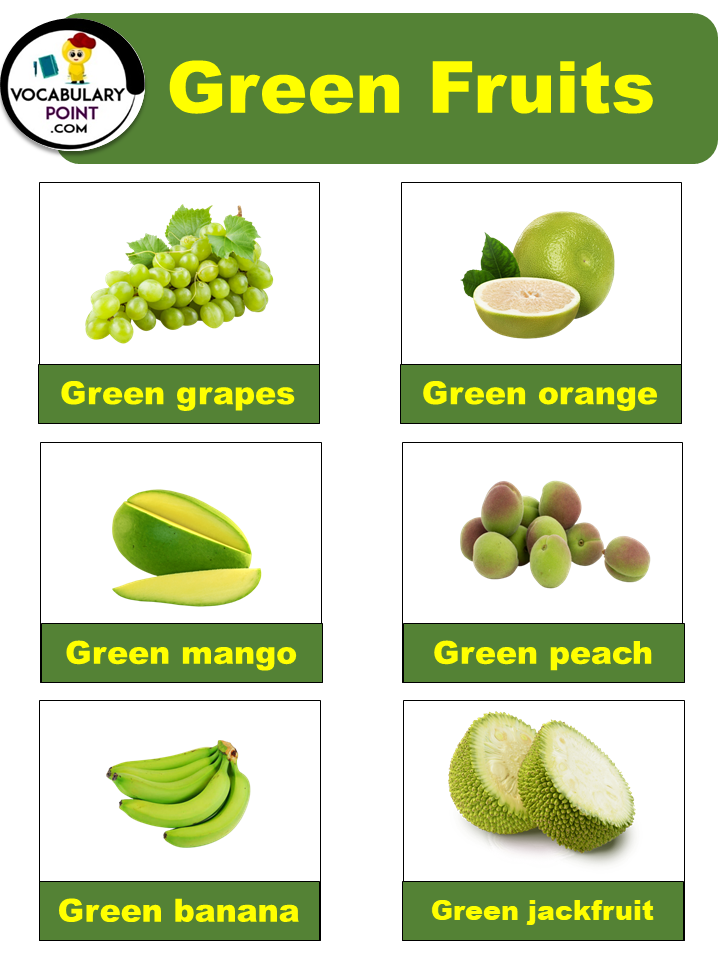
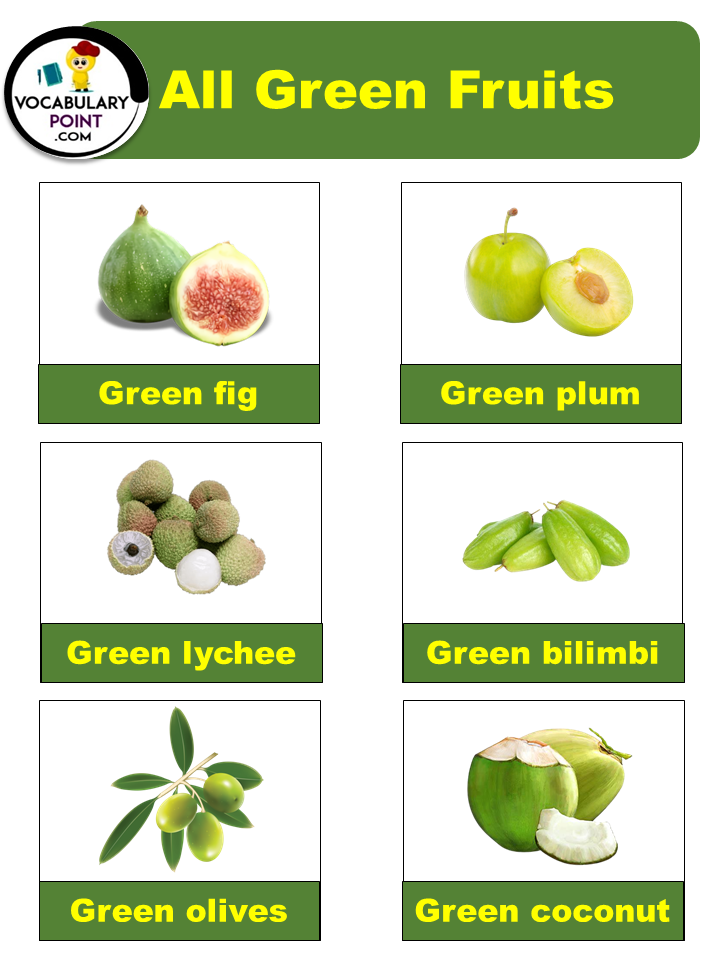
Green Fruits Names with pictures
Green grapes
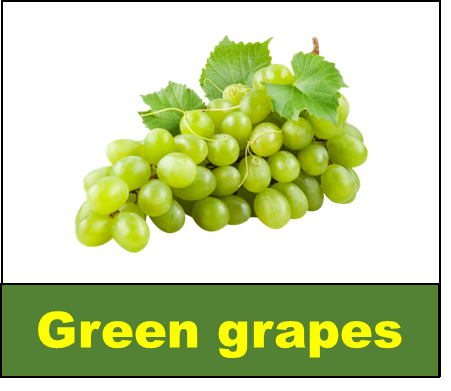
- Antioxidant-Rich:
Green grapes are loaded with antioxidants, such as resveratrol and flavonoids, which help protect your cells from oxidative damage and may reduce the risk of chronic diseases.
- Hydration:
Green grapes have a high water content, making them an excellent choice for staying hydrated. Proper hydration is essential for overall health and well-being.
- Low in Calories:
Green grapes are relatively low in calories, making them a healthy snack option for those looking to manage their weight. They can satisfy your sweet cravings without adding excessive calories to your diet.
Green orange
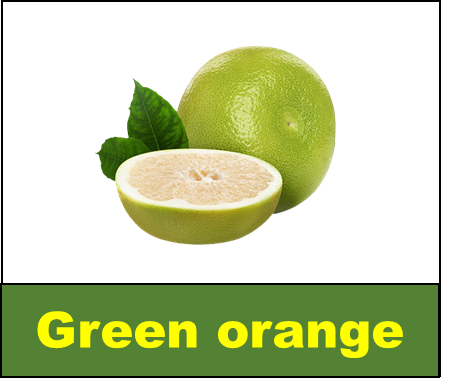
- Source of Vitamin C:
Unripe oranges still contain vitamin C, although in lower amounts compared to ripe oranges. Vitamin C is essential for a healthy immune system and skin health.
- Digestive Aid:
Unripe oranges can provide dietary fiber, which aids in digestion and helps prevent constipation. Including them in your diet may promote a healthy digestive system.
- Antioxidant Properties:
Even in their unripe state, oranges contain antioxidants that can help protect your cells from oxidative damage, reducing the risk of chronic diseases. Incorporating unripe oranges may provide some antioxidant benefits.
Green mango
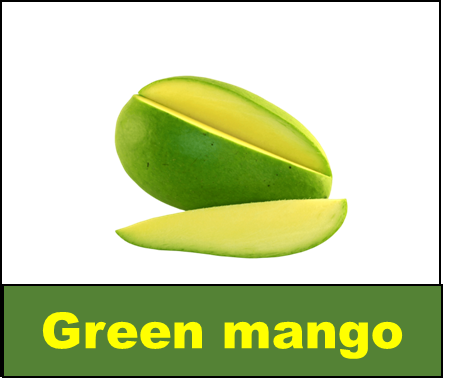
- Rich in Vitamin C:
Green mangoes are a good source of vitamin C, which is essential for a healthy immune system, skin health, and wound healing.
- Aid in Digestion:
Green mangoes contain enzymes like amylases that can aid in digestion. They may help promote a healthy digestive system and prevent constipation.
- Weight Management:
Green mangoes are low in calories and high in dietary fiber, which can help you feel full and satisfied. Including green mangoes in your diet may support weight management by curbing overeating.
Green peach
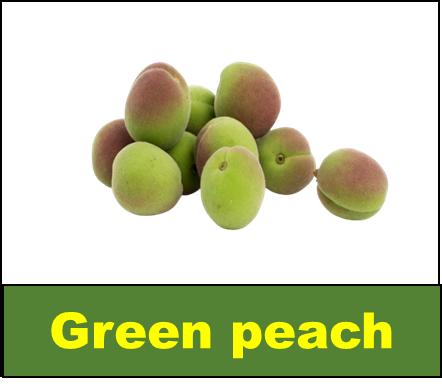
- Source of Vitamins:
Green peaches contain vitamins like vitamin C and vitamin A, which can contribute to a healthy immune system and good vision.
- Digestive Health:
The dietary fiber in green peaches can aid in digestion and promote regular bowel movements, supporting a healthy digestive system.
- Antioxidant Properties:
Even when unripe, green peaches contain some antioxidants that help protect your cells from oxidative damage and reduce the risk of chronic diseases. Consuming green peaches may provide certain antioxidant benefits.
Green banana

- Resistant Starch:
Green bananas are a good source of resistant starch, which acts as a prebiotic, feeding beneficial gut bacteria and promoting a healthy digestive system.
- Balanced Blood Sugar:
The resistant starch in green bananas may help regulate blood sugar levels by slowing the absorption of sugar in the digestive tract, making them a suitable option for people with diabetes.
- Rich in Vitamins and Minerals:
Green bananas contain essential vitamins and minerals like vitamin B6, vitamin C, and potassium, which are important for overall health, immune function, and maintaining proper heart function.
Green jackfruit
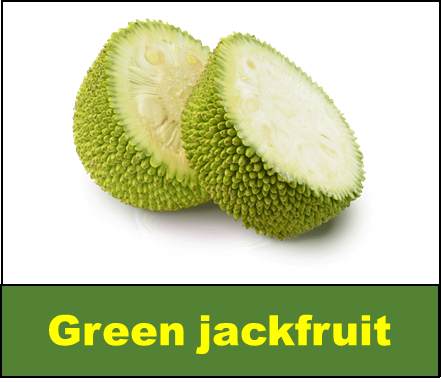
- Dietary Fiber:
Green jackfruit is rich in dietary fiber, which aids in digestion, promotes regular bowel movements, and supports a healthy digestive system.
- Low in Calories:
Green jackfruit is relatively low in calories, making it a suitable choice for those looking to manage their weight while still enjoying a satisfying meal.
- Source of Vitamins and Minerals:
Green jackfruit contains essential vitamins and minerals such as vitamin C, potassium, and vitamin B6, which contribute to overall health, immune function, and proper heart function.
Green fig
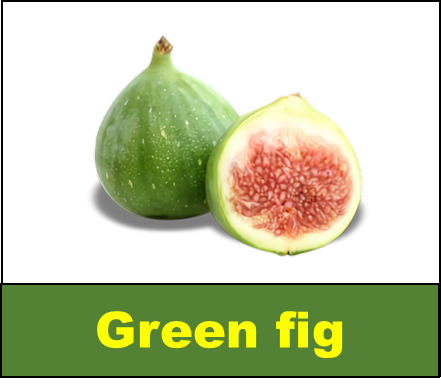
- Dietary Fiber:
Green figs are a rich source of dietary fiber, which aids in digestion, promotes regular bowel movements, and supports a healthy digestive system.
- Nutrient Dense:
Green figs contain essential vitamins and minerals, such as potassium, vitamin K, and calcium, which contribute to overall health, bone health, and proper muscle function.
- Antioxidant Properties:
Green figs provide antioxidants that can help protect your cells from oxidative damage, reducing the risk of chronic diseases and supporting overall well-being.
Green plum
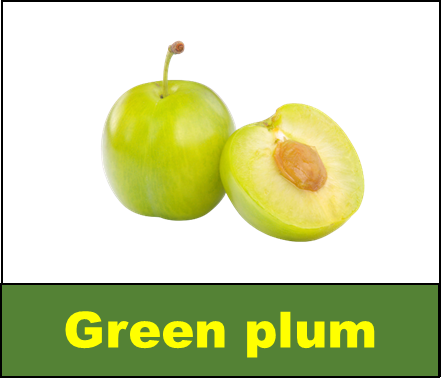
- Rich in Antioxidants:
Green plums are packed with antioxidants that help protect your cells from oxidative damage and reduce the risk of chronic diseases.
- Aid in Digestion:
Green plums are a good source of dietary fiber, which aids in digestion, promotes regular bowel movements, and supports a healthy digestive system.
- Vitamin C:
Green plums provide vitamin C, which is essential for a strong immune system, healthy skin, and wound healing.
Green lychee
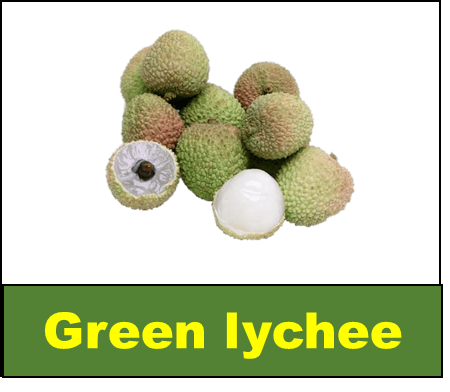
- Rich in Antioxidants:
Green lychee is abundant in antioxidants, which help protect your cells from oxidative damage, reduce inflammation, and may lower the risk of chronic diseases.
- Dietary Fiber:
Green lychee contains dietary fiber, which aids in digestion, supports regular bowel movements, and contributes to a healthy digestive system.
- Vitamin C:
Green lychee provides vitamin C, an essential nutrient that boosts the immune system, promotes healthy skin, and aids in wound healing.
Green bilimbi
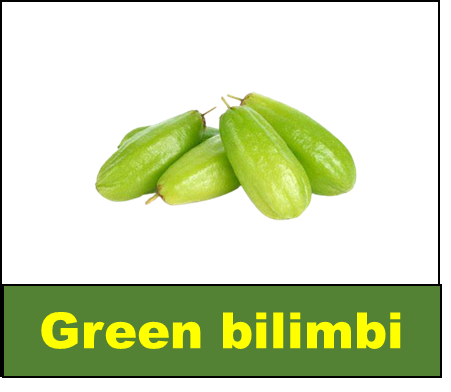
- Rich in Antioxidants:
Green bilimbi is loaded with antioxidants that help protect your cells from oxidative damage, reducing the risk of chronic diseases.
- Aid in Digestion:
Green bilimbi contains dietary fiber, which aids in digestion, supports regular bowel movements, and contributes to a healthy digestive system.
- Vitamin C Content:
Green bilimbi provides vitamin C, which is essential for a strong immune system, healthy skin, and wound healing.
Green olives
- Antioxidant Rich:
Green olives are loaded with antioxidants, which help protect your cells from oxidative damage and reduce the risk of chronic diseases.
- Heart Health:
Green olives contain monounsaturated fats, which are heart-healthy fats that can help lower bad cholesterol levels and reduce the risk of heart disease.
- Source of Iron:
Green olives provide iron, an essential mineral that is important for oxygen transport in the body and the prevention of iron-deficiency anemia.
Green coconut
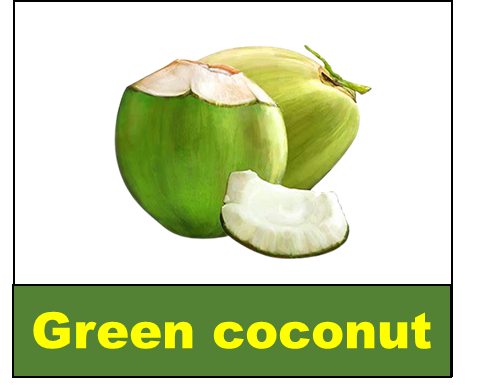
- Hydration:
Green coconut water is a natural and refreshing source of hydration, as it contains electrolytes such as potassium, sodium, and magnesium, making it an excellent choice to replenish fluids.
- Nutrient-Rich:
The water from green coconuts is rich in vitamins and minerals, including vitamin C, B-complex vitamins, and essential minerals like potassium and magnesium, which contribute to overall health.
- Low in Calories:
Green coconut water is relatively low in calories and has no added sugars, making it a healthy and low-calorie beverage option for those looking to maintain or lose weight while staying hydrated.
